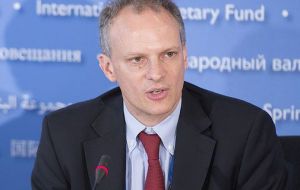MercoPress. South Atlantic News Agency
“Least difficult phase of economic growth is now over”, IMF top official tells Latam
 Werner said Latam countries closely-linked to the US economy will have a better year
Werner said Latam countries closely-linked to the US economy will have a better year IMF Director for the Western Hemisphere Department Alejandro Werner has once again called on Latin America to embark upon economic reforms, claiming that the “least difficult” phase of economic growth is now over.
The IMF most recently forecast a 2.5% Gross Domestic Product growth rate for the region this year, which it has termed “modest,” to be followed by 3% growth in 2015 and Werner attributed the lower growth rates to the of the commodities boom, instability in international capital markets and the region pushing up against the upper limits of its current production capacity.
Werner differentiated between Latin American countries closely-linked to the US economy, which he predicted will have a marginally better year, and those more dependent on commodities, which is the case of the Southern Cone including Argentina, for example.
Werner’s comments were further to statements on Argentina, which warned of reduced commodity prices but also recognized the “recent measures to allow for a weaker exchange rate, higher domestic interest rates, and a reduction in certain utility subsidies are steps in the right direction” which are found in the IMF Regional Economic Outlook for the Western Hemisphere published in April 2014.
The Outlook forecast sharp decreases in the growth rate in the prices of commodities typically traded by the region in the 2014-2019 period, with the regional average about 6.5 percentage points lower than the commodity boom period of 2003-2011.
The same report forecasts a negative growth rate of about 5% in prices for net Argentine commodities from 2014 to 2019, taking an average of products that are exported and imported by the country.
Increased global supply of commodities and reduced demand from China have been suggested as some of the causes for reduced international commodity prices.
Although the region cannot on its own set international commodity prices, Werner was more optimistic that sound public policy would be able to minimize the impact of a normalization of US monetary policy, namely the increase in interest rates.
Furthermore, Werner added that many Latin American economies have very low unemployment figures and that there is little excess capital to be used to increase productivity.
This combination of fully utilized resources of labor and capital, Werner contends, means that “growth is now harder to achieve because it requires investment.”
Having made his diagnosis, Werner pointed to two key areas that could help to overcome the hurdle of reduced commodity prices by improving productivity: education and infrastructure.
Considering that “the countries in the region did not invest as was hoped” Werner and that “in all countries there is poor performance with respect to education. It’s a fundamental issue and the region must work to improve its education systems.”
Werner’s emphasis on investments in education and infrastructure, and IMF Director Christine Lagarde’s dismissal of “structural adjustment” programs as a part of the past, are in contrast with the belt-tightening liberalization policies issued during the Washington Consensus of the 1990s.




Top Comments
Disclaimer & comment rulesCommenting for this story is now closed.
If you have a Facebook account, become a fan and comment on our Facebook Page!